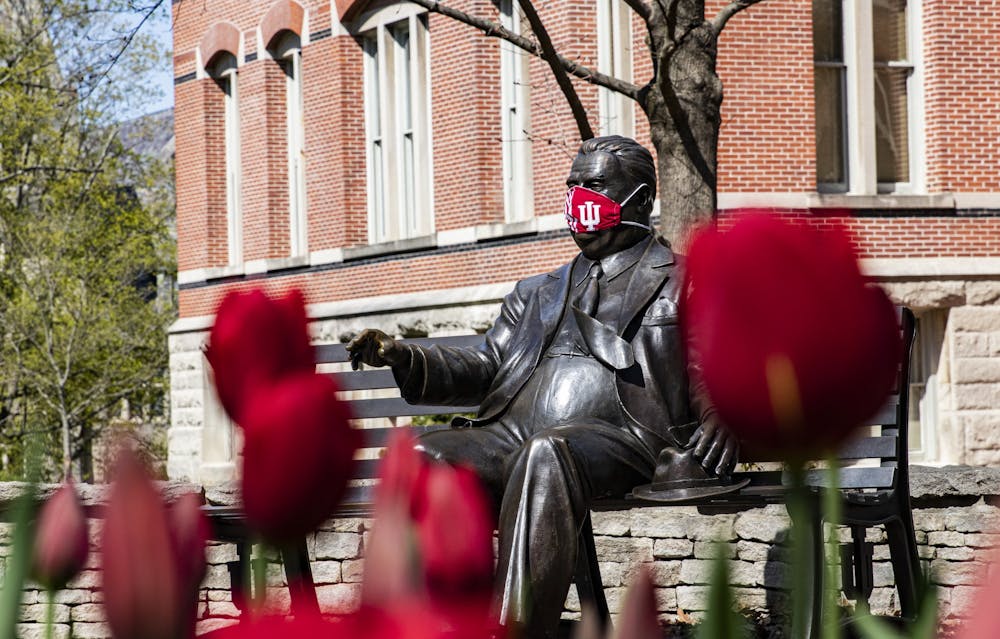There are only six more weeks of summer before the fall semester begins, which would normally bring excitement at reuniting with friends and challenging new classes. This year, however, that feeling of anticipation is diluted by wariness and concern for how safe life at IU will be in the midst of the COVID-19 pandemic.
Unfortunately, the fluid nature of the COVID-19 crisis means that many questions regarding how IU will operate this year remain unanswered. IU has sent out several emails addressing common concerns such as online and in-person classes and campus housing. With only a few weeks remaining before the start of classes, too many variables about university life are still unknown.
The primary concern about this year for students is how IU will be able to keep things relatively safe if it is going to attempt to provide a hybrid school experience. Places like dining halls and libraries, events such as sports games and the IU Dance Marathon and student organizations haven’t been fully addressed. Beyond campus, the arrival of just under 50,000 people will force Bloomington to address safety measures around town.
Places on IU Bloomington’s campus like the Herman B Wells Library and the Indiana Memorial Union are central hubs that see thousands of students each day. While various web pages describe efforts to limit exposure, such as no-contact pickup of library materials and emphasized social distancing in common areas in libraries, computer labs and lounges, details are disconcertingly sparse.
While more information and details will come in the weeks leading up to the start of classes, IU has made a few things clear. Everyone will be required to wear a Centers for Disease Control and Prevention-approved face mask while inside IU buildings and outside when not able to be physically distanced from others.
Additionally, all domestic students will be required to be tested for COVID-19 within 10 days of arriving in Bloomington, and international students will be required to self-quarantine for two weeks after arriving in the U.S.
Throughout the year, testing will be available for faculty, staffand students at various locations on or near campus. However, a solidified course of action has not been published on IU’s Fall 2020 FAQ page for when to move all instruction online in case of an outbreak at IU.
One of the greatest challenges for keeping students safe throughout the year will be on-campus bus services. While IU has said they will be restricting buses to only carry up to 10 passengers at a time, anyone who has ever ridden the A Bus is bound to have serious concerns both about how that will be enforced and how efficient it will be for passengers who rely on the bus system.
Meanwhile, there is an abundance of questions about how life in Bloomington will look this year outside of classes and transportation around town. IU has released a checklist for planning large events such as sporting events and performances, but there aren’t many specifics beyond distancing between guests, minimizing transactional contact and wearing masks.
Big 10 Conference recently announced that it will only be playing games within the conference, the IndyStar reports. IU plans to host at least a few football games this season, but there has been no word on whether there will be fewer tickets available to allow distance between observers. It is unclear whether tailgating will be allowed and whether the police will be enforcing guidelines on parties.
Last month, the City of Bloomington closed car access to part of Kirkwood Avenue to allow restaurants to expand outdoor seating into the street for a safer dining experience. However, it’s unclear whether the sharp influx in Bloomington’s population this August, in addition to constantly changing conditions across Indiana and the U.S., will change guidelines on restaurant and bar operations.
Just yesterday, more than 15,000 new cases of COVID-19 were reported in Florida alone, according to the New York Times. Indiana has been very eager to leave a state of lockdown, but a rising trend of new cases forced Gov. Eric Holcomb to delay fully reopening the state with an improvised Stage 4.5 in the Back on Track plan.
When discussing how to safely start the school year at IU, we can’t just think about direct health risks to faculty, staff and students. The ripple effect stretches far beyond just them to their families and roommates, coworkers, employees at local businesses and year-round residents of Bloomington.
Negligence in starting this fall will only lead to more sickness and difficulty for the city. IU must work to establish clearer guidelines on how it will keep the students, staff, faculty and the city at large safe if they’re asking us to return to a semester at least partially in person. To do otherwise would be foolish and reckless. Even as we’re excited to return to campus, we need to be cautious and thoughtful about keeping ourselves and others safe.
Everett Kalman (he/him) is a junior studying law and public policy and is the vice president of external affairs for Culture of Care at IU. He plans on practicing immigration law in the future.




